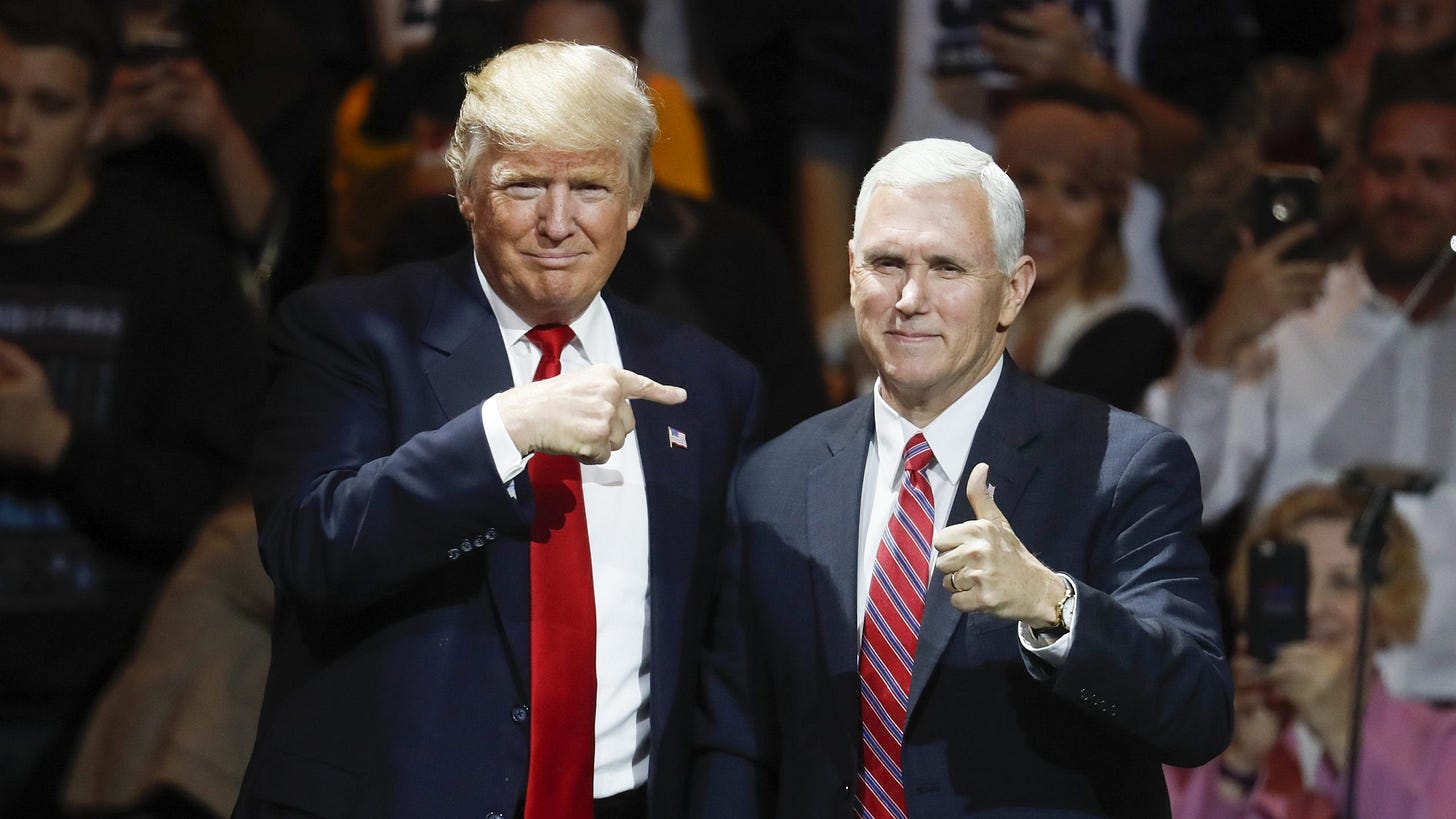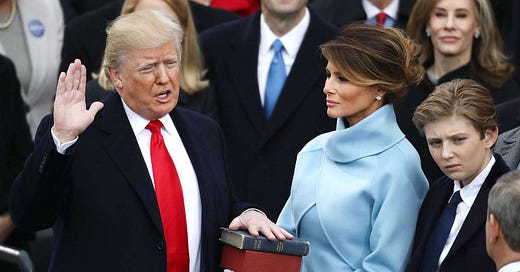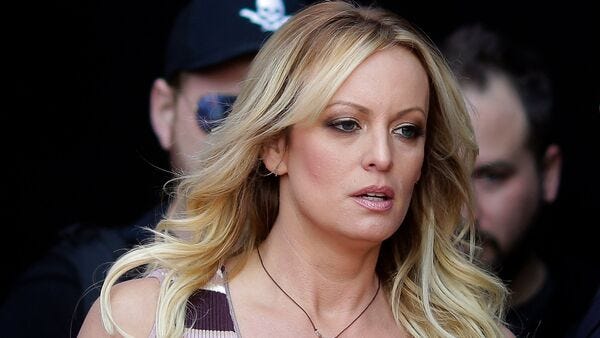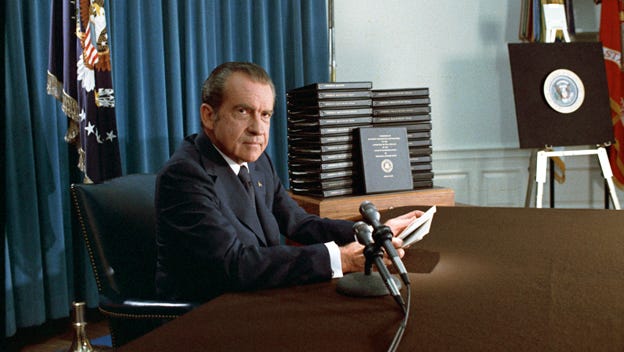Donald Trump in a Deep Swamp? An analysis of his legal quagmire.
The Legal Quagmire of Donald Trump: An Analysis of his culpability and Presidential Immunity.
Introduction
The presidency of Donald Trump has been, arguably, one of the most contentious in recent American history. His legal challenges extend far beyond his term in office, casting a web of criminal cases that loom large. In this concise article, we aim to unravel the intricate legal issues surrounding Trump, delve into the question of Presidential immunity, and offer an overview of the four active criminal cases against him. We'll conclude by exploring the political landscape, with insights from Republican presidential hopeful Vivek Ramaswamy.
Legal Questions on Presidential Culpability
Since President Nixon's 1974 resignation in the wake of the Watergate scandal and his subsequent pardon by President Ford, the United States has not faced a scenario where a former President could be criminally convicted. This underscores the enduring legal ambiguity about the culpability of a sitting U.S. President for alleged offences committed before taking office, during their tenure, and after leaving the role. The U.S. Constitution is notably silent on this complex issue, leaving it open for continuous interpretation and debate.

Presidential Immunity Under U.S. Federal and State Laws
Actions Taken in Capacity as President
Department of Justice Guidelines: The U.S. Department of Justice (DOJ) maintains guidelines suggesting that a sitting President should not be indicted while in office. The rationale behind this is to ensure that the President's responsibilities aren't impeded.
Impeachment: While the U.S. Constitution is notably silent on criminal culpability, it does outline a mechanism for impeachment in cases of "high Crimes and Misdemeanours," generally viewed as the suitable route for addressing alleged misconduct while in office. In this process, the House of Representatives holds the power to impeach the President, essentially bringing charges. If the House votes in favour, the Senate then conducts a trial to determine whether or not to convict and remove the President from office.
Executive Immunity: The concept has been cited in multiple court cases to protect a President from civil litigation concerning actions taken while executing official duties. However, its relevance to criminal cases is still a grey area.
Alleged Offences Unrelated to Presidential Duties
Civil Cases: For example, President Bill Clinton faced civil litigation over sexual harassment, which was allowed to proceed by the Supreme Court.
Criminal Charges: The DOJ guidelines remain silent on the immunity for criminal actions unrelated to presidential duties, leaving room for legal interpretation.
Limitations on State Actions
Supremacy Clause: Federal law takes precedence over state law under the U.S. Constitution. Although this principle is commonly invoked in civil cases, its applicability to criminal law remains disputed.
Federal Prosecution: A sitting President is more likely to be charged under federal law, thereby overshadowing state prosecutors' jurisdiction. However, there is no explicit constitutional provision preventing states from indicting a sitting President.
A Snapshot of Ongoing Criminal Cases Against Trump
Below is a summary of the four criminal trials that former U.S. President Donald Trump is facing:
Georgia: State Case on 2020 Election
Charges: Trump faces 13 state charges for allegedly trying to overturn Joe Biden’s 2020 victory in Georgia.
Developments: Weekly hearings are scheduled, and the case is expected to span four months due to the volume of witnesses.
Key Legal Arguments: Trump aims to move the case from state to federal court, although a similar effort by his co-defendant, Mark Meadows, failed.
D.C.: Federal Case on 2020 Election
Charges: Trump faces four federal charges for alleged efforts to overturn the 2020 election results.
Developments: A D.C. grand jury continues to meet, suggesting that additional indictments may be on the horizon.
Key Legal Arguments: Whether Trump's actions are covered by executive immunity is central to the case.
Florida: Federal Classified-Documents Case
Charges: Trump faces 40 federal charges over accusations of mishandling classified documents.
Developments: Ongoing disputes between federal prosecutors and Trump’s defence team could lengthen the trial.
Key Legal Arguments: A former Mar-a-Lago IT worker is confirmed to be cooperating with the government, adding complexity to Trump's defence.
New York: State Business-Fraud Case
Charges: Trump is implicated in 34 state charges related to hush money payments made to the adult-film actress Stormy Daniels, during the 2016 campaign.
Developments: The case had a quiet week, although Trump was found liable in a civil case for defaming writer E. Jean Carroll.
The Possibility of a Presidential Pardon
In the United States, the President possesses the authority to issue pardons. As previously noted, Gerald Ford's pardon of Richard Nixon serves as a prominent example that a former President could be pardoned for offences committed during their tenure. This segues into the political dialogue featuring Vivek Ramaswamy, a dark-horse candidate for the Republican nomination, who has declared that he would pardon Donald Trump if elected. While this stance may resonate with a segment of voters, it remains a topic of considerable debate.
Concluding Thoughts
The legal entanglements involving Donald Trump are intricate and unprecedented. They raise complex questions about presidential immunity and the capacity of the state to bring charges against a sitting or former President. Vivek Ramaswamy's stance on pardoning Trump adds an interesting dynamic, indicating the politically charged nature of these legal debates. It will be fascinating to see how these issues evolve, especially as we approach the 2024 U.S. presidential elections.
As new developments unfold, we will endeavour to keep you abreast of the latest information, either by updating this article or by publishing a new piece in the event of significant changes.
UPDATE (week ending 17th September, 2023)
Let's summarise the developments in the four legal cases involving Donald Trump in the past week and what is expected in the near future for each.
1. Georgia: State Case on 2020 Election
Last Week: Trump faces 13 state charges for allegedly attempting to reverse the 2020 election results in Georgia. Judge Scott McAfee rejected District Attorney Fani Willis's request to have Trump tried alongside other defendants by late October, deeming it unrealistic.
Upcoming: No trial date has been set yet. Judge McAfee hinted at breaking the trial into smaller groups, each expected to have about 150 government witnesses and last around four months.
2. D.C.: Federal Case on 2020 Election
Last Week: Trump faces four federal charges. Judge Tanya S. Chutkan is considering imposing a gag order on Trump, requested by the prosecution team led by special counsel Jack Smith. Trump has demanded Judge Chutkan recuse herself for alleged bias.
Upcoming: The trial is set for March 4, 2024. The gag order discussion is expected to continue.
3. Florida: Federal Classified-Documents Case
Last Week: Trump faces 40 federal charges related to retaining top-secret government documents at Mar-a-Lago. Judge Aileen M. Cannon outlined rules for reviewing classified evidence during discovery.
Upcoming: Trial is planned for May 20. Trump's team must review sensitive materials in a secure government facility.
4. New York: State Business Fraud Case
Last Week: Trump faces 34 state charges concerning hush money paid to adult-film actress Stormy Daniels. A scheduling hearing was skipped, suggesting the trial might be delayed.
Upcoming: The trial is set for March 24 but could potentially be pushed back.
The judicial proceedings are evolving and draw considerable public attention. As these cases develop, they are bound to ignite further debates and discussions both legally and politically.
UPDATE (week ending 24th September, 2023)
Here is a summarised version of Donald Trump's ongoing legal battles:
"The Trump Trials and Tribulations" provides updates on various criminal cases and other difficulties being faced by the 45th President of the United States in both federal and state courts.
Key Developments:
Gag Order Discussion: Prosecutors have asked U.S. District Judge Tanya S. Chutkan to issue a gag order restricting what Donald Trump can say regarding the election-obstruction case he faces. The proposed gag order aims to prevent Trump from making inflammatory comments that could potentially impact the trial. Trump’s lawyers argue that as a Presidential candidate, he has the right to respond to criticism.
Georgia Case: Trump faces 13 state charges related to attempts to overturn the 2020 election results in Georgia. No trial date has been set yet.
D.C. Federal Case: Trump faces four federal charges concerning alleged efforts to overturn the 2020 election results. The trial is planned for March 4, 2024.
Florida Case: Trump faces 40 federal charges over accusations that he kept top-secret documents at his home. The trial is set for May 20, 2024.
New York Case: Trump is facing 34 state charges connected with hush money paid to adult-film actress Stormy Daniels. The trial is set for March 25, 2024.
Other Highlights:
Attorney General Merrick Garland has testified before the Republican-led House Judiciary Committee, mostly being questioned on matters other than the Trump cases.
Personal Presence of Trump? Legal experts say that Donald Trump is almost certainly required to be physically present in court each day during his various trials. While defendants can sometimes skip pretrial proceedings, missing an actual trial would be extremely unusual. The time commitment is significant; Georgia prosecutors estimate their case alone could last up to four months. Being physically present in court could notably intersect with Trump's potential presidential campaign activities. One legal expert noted that while Trump could theoretically waive his right to appear in court, such a move is unlikely to be well-received by a jury.
CIPA (Classified Information Procedures Act), the law passed by the Congress in 1980, is a significant factor in the Florida case, aiming to manage classified information during the trial.
The Classified Information Procedures Act (CIPA) addresses the "graymail" problem in national security cases. Graymail is a tactic where defendants suggest they may reveal classified information during the trial in hopes of intimidating prosecutors into dropping the charges. CIPA establishes a framework for determining how classified information will be handled during the trial, including pretrial motions and hearings. In Donald Trump's ongoing Florida case concerning classified documents, a CIPA hearing was held on September 12, which was not open to the public. While news reporters often dislike the secrecy surrounding such hearings, lawyers find CIPA procedures time-consuming and cumbersome.









Most of the charges are frivolous and politically motivated. He is favored to be the next President